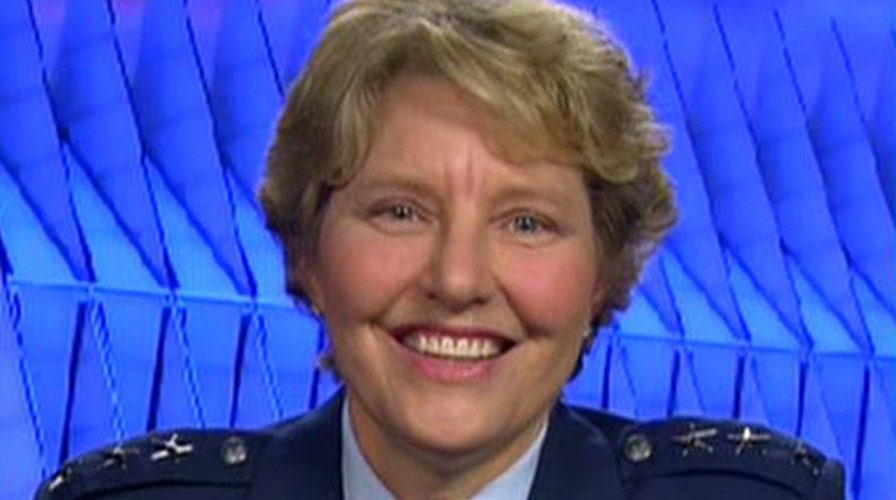Military trailblazer reflects on being a proud American
#ProudAmerican: Lt. Gen. Michelle Johnson, the first woman to lead a US Department of Defense Service Academy, on why she's proud to be an American and the US Air Force base in England cancelling July 4th celebrations because of terror threats
This is a rush transcript from "On the Record," July 2, 2015. This copy may not be in its final form and may be updated.
SANDRA SMITH, 'ON THE RECORD' GUEST HOST: The Fourth of July is canceled at the two U.S. Air Force bases in England. New fears and a terror threat alert ending any chance of an Independence Day celebration for the American service members based there.
Lieutenant General Michelle Johnson joins us now. And Happy Fourth of July weekend to you.
LIEUTENANT GENERAL MICHELLE JOHNSON, U.S. AIR FORCE ACADEMY SUPERINTENDENT: Thanks very much.
SMITH: It's not good. Not pleasant news for us to hear this as we head into the weekend. One of these is the largest U.S. Air Force base in England.
JOHNSON: Well, of course I can't speak for the situation that those commanders face. They're privy to threat streams, and intelligence and their security reports, just as we pay attention to that here at home. We have to be mindful, in this day and age, the world is flat. And that makes threats a little different than they've been. But for us at the United States Air Force Academy, we're the number one man-made tourist attraction in Colorado. So we go to great lengths to try to remain open. But ever more vigilant, and we worked very closely with Northcom and the other federal law enforcement agencies to pay attention, so that we can protect our cadets and our visitors, but also are mindful that world is changing.
SMITH: The world is changing. And you're part of that changing world. Lieutenant General, you have such an inspiring story. I literally had somebody stop me in the hallway and say I heard you're talking to Lieutenant General Michelle Johnson. She inspired me. I heard her story is amazing. You do have an amazing story. And you've paved the way for a lot of women specifically in the military.
JOHNSON: Well, you know, it's just -- I've sort of lived at a certain time in history right. So in 1975, President Ford signed legislation that changed the role of women in the military. And women were able to then attend federal service academies and go to jet pilot training. And even parliament changed Cecil Rhodes will so that women could be Rhode Scholars. And so my adult life is sort of been that way with history. And I'm really grateful for the opportunity to serve and horizons that have really been opened up for me. And I hope I can pass that along to our cadets here.
SMITH: You're the first woman cadet Wing Commander, as well as the first woman Rhode Scholar for the academy. You had a 34-year career in service to this great nation. You have just an absolutely amazing story. How do you see the overall environment changing today for the military as a whole?
JOHNSON: Well, you know, our nation has changed. Our population has increased to the point where we're over 300 million people. The demographics of our nation have changed. And the profession of arms has changed. So whereas I flew cargo and air refueling aircraft since the early '80s, until more recently I fly at dusk. But back in the day for 20 years, I flew the line. And now women fly fighter aircraft, and we're also linked beyond aircraft, beyond platforms through cyber, through satellites, we're joined with the other services, we're coalition with our partners around the world. And so our challenge is to help prepare our cadets to be agile in their thinking, to be inclusive, and to realize that no one of us can do this. We need to sort this out together. And this is what is different in the inclusiveness in our habits of thought have to change from 34 years ago.
SMITH: You talk so much in this piece that you wrote about the challenges that you face and how you face those challenges head on. And at some point you wanted to give up. You reminded us as a kid, you were on the roof top of these farm buildings in Iowa, you know, with big dreams on those roof tops with your German Shepard, out looking at the horizon. And you have these dreams but faced so many challenges, challenges that so many of us face that sometimes we just feel like giving up. How did you beat and overcome those challenges?
JOHNSON: Well, it was a different time. And people react to change in a harsh way. A lot is pretty shocking when you're a young person and to be overtly, you know, questioned for your presence and why you are here and -- it's just put one foot in front of the other and keeps the faith. And also realize in the midst of those negative voices, what had been fortunate to encounter are the wonderful mentors, people who say you know, here's what's possible. And I think those decades ago, I didn't really know what my opportunities were. I was mentored into flying by someone who said to me, you know, you could do this. I was mentored into a competing for a Rhode Scholarship, and that's what the reality as well. And to become focused and listen to those voices, that gets you through.
SMITH: It's a great story. Lieutenant General, thank you so much. You make me a proud American. And thank you so much for your service.
JOHNSON: My honor. Thank you.

